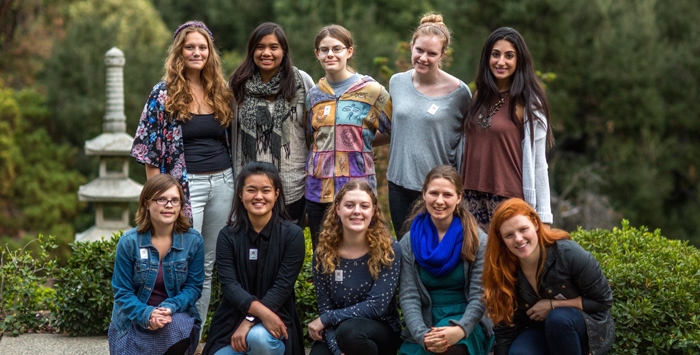
In the past few months, the Humanities Institute has had a lot to say about silence.
“Silence,” the institute’s fall theme, featured 15 public events at 51�������, including talks, film screenings, a piano concert, and Prison Obscura, a powerful exhibition featuring rarely seen vernacular, surveillance, evidentiary, and prisoner-made photographs. Deaf Jam, a documentary tracing a deaf teenager’s entry into the world of spoken-word slam poetry, kicked off the semester on September 11, followed by Q&A with Tahani Salah, one of the movie’s stars; the writer and translator Lydia Davis closed the series with a seminar on translation and a public reading of her short stories – standing room only in the Hampton Room – on November 20.
For a full listing of fall events, .
The institute’s unique ongoing explorations of one topic are of particular advantage to its Junior Fellows. Students apply to the program each semester to address the semester’s theme from a range of perspectives; they attend each public event and meet with speakers in seminar the following day. For this fall’s programming on Silence, the Humanities Institute collaborated with such signature campus programs and venues as the Core Program in Interdisciplinary Humanities, the Williamson Gallery, the Clark Humanities Museum, and Denison Library. Public events were held across campus and in Honnold/Mudd Library; in addition to the weekly public events and seminars, field trips took students to the Silent Movie Theater in Los Angeles, on a curator’s tour of Haunted Screens: German Cinema in the 1920s at the Los Angeles County Museum of Art, and on a curator’s tour of the Japanse Gardens at the Huntington Library, Art Collections and Botanical Gardens in San Marino.
Silences, a second exhibition sponsored by the Humanities Institute and on display until December 16 in Denison Library, was curated by the fall Fellows using material from the special collections of the Claremont Colleges Libraries.

The 2014 Fall Humanities Institute Junior Fellows
One of the ten Fellows, Harriet Lindeman ’17, describes some of the running themes and lessons learned this fall:
“While this semester we’ve explored personal silences and collective silences, physical silences and metaphoric silences, in any context, silence can be experienced only subjectively, within a limited framework, for silence implies an absolute that’s unattainable in a world as diverse and disorderly as ours. Moving the frame out just slightly from a couple sitting without speaking, there will always be a fly buzzing or a car passing by, breaking the silence.
“For any topic supposedly entombed in silence, an individual might refuse to honor this taboo. Within a ‘silenced’ population, there will be those who make their voices heard. A threatening silence will never fully consume, a freeing silence will never fully liberate, and a tranquil silence will never fully bring peace, for silence itself can never be fully realized. It remains a nebulous, malleable concept, powerful in its absoluteness and its unattainability.”
Juliet Koss, associate professor of art history and, this semester, director of the Humanities Institute, thoroughly enjoyed orchestrating the silences at 51�������.
“We began with a number of very large questions,” she says. “Is silence the absence of sound? Is it a refusal to speak – or an inability to respond? What are the politics of silence? How has silence been enjoyed, mandated, or inflicted across historical periods and in a range of cultures and geographic locations? How are silence and gender related? Can silence be palpable, visual, deafening, architectural, dynamic? Does silence signify absence? Does it entail presence? Does silence make you nervous?
“Response to the programming and at the events themselves has been overwhelmingly positive, with soaring attendance figures and extraordinary enthusiasm from the Claremont campuses and elsewhere. I’ve never received so many thank-you notes – from students, faculty, staff, and others in Claremont and Los Angeles. The visiting speakers and performers have been an extraordinarily varied bunch, covering half a dozen nationalities and more than a dozen disciplines, and they’ve been great to have on campus. We also had four wonderful lunchtime seminars for Claremont faculty to present and discuss their work with students, faculty, and staff. And frankly, working with the Junior Fellows this semester has been an absolute treat. So, to invoke Hamlet’s last lines: ‘given the recent events here – oh, the rest is silence.’ “
Spring 2015 will see a new director and a new theme, “Concepts of Self.”
“I chose next semester’s theme because there is a great deal of new work happening on the self in many different fields, spanning from the sciences to the humanities, and in studies of non-Western traditions,” says Yuval Avnur, associate professor of philosophy and the institute’s incoming director. “I thought it would be perfect given the interdisciplinary mission of the Humanities Institute.
“Part of the idea for the semester is to bring out multiple people at the same time, so we get to see them discussing these ideas amongst themselves, and challenging each other. I’m especially looking forward to a two-day conference March 6-7 on comparative cross-cultural approaches to the self. We’ll bring scholars together from many different fields, and who work in some different traditions, and see what happens. I’m hoping sparks will fly.”
Visit the Humanities Institute website for videos, podcasts, and event information reaching back to its founding in 1986, or follow it on and .

